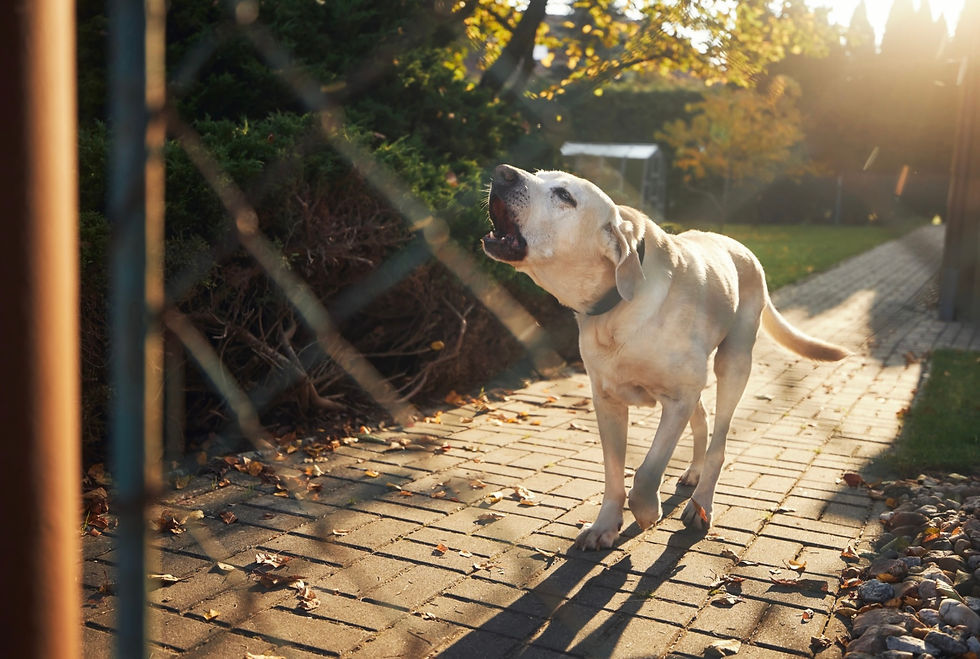Understanding Canine Guardianship: Navigating Dog Aggression in the Yard
- Cristina McKay
- Oct 29, 2023
- 3 min read

There's an age-old saying that a dog is a man's best friend, and indeed, our furry companions have been cherished throughout history for their unwavering loyalty and friendship. Dogs, as pets, become an integral part of our families, offering companionship, joy, and sometimes, an added layer of protection. In this blog post, we explore the fascinating connection between dogs and their owners, shedding light on how this loyalty can sometimes translate into territorial behaviors, especially in their own yards.
The Loyalty-Protection Link:
The loyalty of a dog goes hand in paw with its instinct to protect its owner. This loyalty-driven protective instinct is an inherent trait that, in the wild, served to safeguard the pack from potential threats. In our homes, however, even the sweetest and most loving dogs can exhibit protective behaviors, particularly when it comes to defending their territory—your yard, and their pack—you and your family.
Territorial Instincts and Predisposed Breeds:
Dogs, by nature, have a territorial instinct that stems from their wild ancestry. This instinct extends to safeguarding not only their physical territory but also their pack, which, in a domestic setting, includes the human family members. Certain breeds are predisposed to being more territorial due to their historical roles as guard or working dogs. Breeds like German Shepherds, Doberman Pinschers, and Rottweilers, for instance, may exhibit heightened protective behaviors.
Avoiding Encouragement:
Understanding that even the gentlest dogs can become territorial is crucial for responsible pet ownership. To manage and discourage such behavior, it's essential not to inadvertently praise the dog for aggressive tendencies. Equally important is not ignoring the behavior, as this can be perceived as acceptance. Striking the right balance in response is key to addressing territorial instincts without amplifying them.
Seeking Professional Help and Early Socialization:
If your dog displays signs of territorial aggression, seeking professional intervention is highly recommended. Professional trainers can provide tailored strategies to manage and modify such behaviors. Moreover, early socialization plays a pivotal role in curbing territorial tendencies. Introducing your dog to various environments, people, and other animals from an early age helps foster a well-rounded and less defensively aggressive companion.
Consistency is Key:
Consistency in training and socialization efforts is paramount. Regularly exposing your dog to new experiences reinforces positive behaviors and reduces the likelihood of territorial aggression. By maintaining a routine that includes positive reinforcement, your dog learns that unfamiliar situations are not threats, contributing to a more well-adjusted and sociable pet.
In our quest for the perfect companionship, it's vital to understand and respect the natural instincts that make our dogs the incredible beings they are. By recognizing and appropriately addressing territorial behaviors, we ensure that our yards remain safe spaces for both our pets and the people who care for them. With the right approach, we can cultivate a harmonious relationship where loyalty and protection coexist without compromising the joyous bond between humans and their four-legged friends.
Note from the author:
“In the world of pet waste removal, our team at Puppy Poo Patrol encounters a variety of challenges. One recurring issue is the aggression some dogs exhibit when strangers like us, enter their yard. This concern isn't merely theoretical; it hits close to home as both I and one of our technicians have experienced dog bites that necessitated medical attention. While we are enthusiastic dog lovers and enjoy giving your fur babies all the love, prioritizing the safety and well-being of ourselves, your furry companions, and you is paramount.” -Cristina McKay



Comments